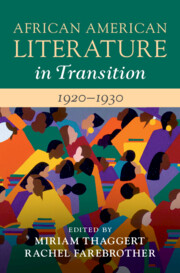Book contents
- African American Literature in Transition, 1920–1930
- African American Literature in Transition
- African American Literature in Transition, 1920–1930
- Copyright page
- Contents
- Illustrations
- Contributors
- Acknowledgments
- Chronology of Historical Events, People, and Publications, 1920–1930
- Preface
- Introduction
- Part I Habitus, Sound, Fashion
- Part II Space
- Chapter 4 Going Dutch
- Chapter 5 The Unmaking of the New Negro Mecca
- Chapter 6 Subversions of Boasian Anthropology in Zora Neale Hurston’s Great Migration Fiction and Ethnography
- Chapter 7 W. E. B. Du Bois and the Fluid Subject
- Part III Uplift Renewed
- Part IV Serial Reading
- Bibliography
- Index
Chapter 5 - The Unmaking of the New Negro Mecca
from Part II - Space
Published online by Cambridge University Press: 17 March 2022
- African American Literature in Transition, 1920–1930
- African American Literature in Transition
- African American Literature in Transition, 1920–1930
- Copyright page
- Contents
- Illustrations
- Contributors
- Acknowledgments
- Chronology of Historical Events, People, and Publications, 1920–1930
- Preface
- Introduction
- Part I Habitus, Sound, Fashion
- Part II Space
- Chapter 4 Going Dutch
- Chapter 5 The Unmaking of the New Negro Mecca
- Chapter 6 Subversions of Boasian Anthropology in Zora Neale Hurston’s Great Migration Fiction and Ethnography
- Chapter 7 W. E. B. Du Bois and the Fluid Subject
- Part III Uplift Renewed
- Part IV Serial Reading
- Bibliography
- Index
Summary
This chapter addresses the potency of the idea of Harlem as a crucible for the formulation of Black modern cultural identity. By focusing on community politics during the 1920s, King rereads James Weldon Johnson’s representation of Harlem in Black Manhattan (1930) as a space of interracial comity and liberalism as a form of propaganda and myth-making. Written as the nation’s economic situation worsened, Black Manhattan functioned as cultural treatise that legitimized the Harlem Renaissance as well as the possibilities it held for urban Black America and the nation at large. King juxtaposes Johnson’s liberal image of Harlem with the lived experience of Harlemites’ encounters with police surveillance and violence, displacement of Black leisure life, as well as labor exploitation. In this way, the chapter challenges Johnson’s narrative of New York exceptionalism, without underestimating the significance that Harlem held for Johnson and many other Black elites during the advent of the Great Depression.
Keywords
- Type
- Chapter
- Information
- African American Literature in Transition, 1920–1930 , pp. 130 - 153Publisher: Cambridge University PressPrint publication year: 2022

